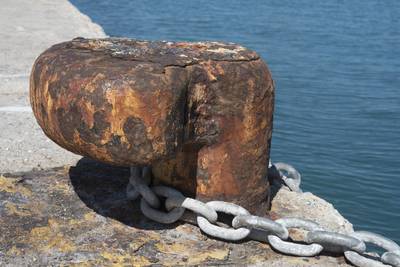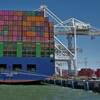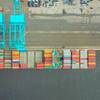The migrants bolted across a street and clambered over a fence into the Greek port at Patras, scouting around for trucks to stow away in.
Dozens at a time scaled a 2-km stretch of fence one afternoon last week, playing cat-and-mouse with police officers who pushed them back only for the men to try again hours later.
They are part of a growing number of migrants in Greece trying daily to smuggle themselves onto ferries at Patras to get to Italy. It's a dangerous passage but it has become more appealing since the closure in 2016 of the overland Balkan route to northern Europe.
A few hundred, mostly young Afghan or Pakistani men, squatted in abandoned factories facing the port and showered in water that ran yellow from rusty pipes.
At night, with fewer officers on patrol, a Reuters team witnessed groups breaking into locks to get into trucks or crawling under tarpaulins.
"Get down! Get down from there!" an officer with the coast guard's special forces squad yelled at a man peering at him from the undercarriage of a truck lined up for embarkation control, who was then handcuffed and escorted away.
Authorities arrested 760 people hiding in trucks or carrying forged travel documents at Patras in January and February, close to a third of the total of 2,627 arrests in 2017, according to official data. In 2016, 1,040 people were arrested.
Those arrested are held at most overnight before they are released, and many try their luck again the following day.
Images from an X-ray van showed hideouts not visible to the naked eye: two men were discovered lying on their backs in a fuel tank. Another crouched beneath watermelons.
The route from Patras, one of two ports linking Greece to Italy, is not new but when Europe's refugee crisis began in 2015 and nearly a million people landed in Greece on boats, taking the overland road to countries like Germany was a safer option.
When those borders closed in March 2016 and a European Union deal with Turkey stranded over 50,000 refugees and migrants in Greece, Patras started buzzing again, said Dimitris Kyriakoulopoulos, a coast guard captain overlooking the port.
"What we're dealing with here is a gradual increase in the number of these people," he said.
Anger is simmering among truck drivers, who sometimes chase migrants away with sticks, fearing arrest if a stowaway is found among their freight.
One driver, who gave his name as Harry, climbed into his truck to find three migrants hiding among stacks of aluminum last Thursday night.
"It's awful. It doesn't get more awful than this and no one takes responsibility," he said.
No one can say how many migrants make it across. Italian authorities returned 147 people to Greece last year, up from 112 in 2016 and 44 in January and February, according to Greek data.
Italy's Interior Ministry did not respond to a request for comment.
Across the port in the squat, migrants spoke of their friends who made it to Italy and said they, too, would keep at it despite the risks.
"Everything is dangerous," said Arshad Wardak, 24, from Afghanistan. "You have to go through all the suffering to get into a better place. So this is why everybody is trying."
(Additional reporting by Steve Scherer in Rome Editing by Matthew Mpoke Bigg)














